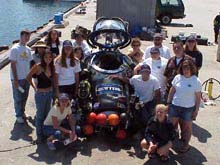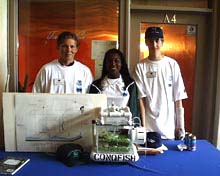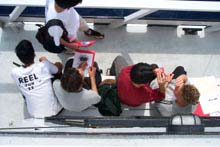
The Sustainable Seas Expeditions strives to give many educators and school-age children the opportunity to participate in the Students-at-Sea program. Kids are able to observe a normal day of submersible operations while shadowing scientists, submersible pilots and the ship's crew.
Outreach: Third SSE Field Season
Claire Johnson, education specialist
National Ocean Service, NOAA
As in past years, this third field season of the Sustainable Seas Expeditions (SSE), the SSE education team will tie educational activities closely to the science and exploration taking place during the “Islands in the Stream” mission throughout the Gulf of Mexico. This marks the first time that the SSE has explored international waters, and our foreign counterparts are excited about the possibilities that a project like SSE can bring to their areas.
The SSE education team will engage high school and university teachers in valuable learning experiences and encourage them to spread the message about the importance of ocean exploration, research and education to individual nations and the world. The SSE devotes tremendous resources to education and outreach because the project leaders strongly believe that people must be aware of how the oceans affect their daily lives, and how their actions will determine the ocean’s ability to sustain the rapidly growing global population. The SSE also strives to inspire the youth of today to become the aquanauts, marine scientists, and ocean explorers of tomorrow.
The SSE has focused on captivating the public through engaging educational pursuits. Most education and outreach activities focus on one or more of the following: professional teacher development, student programs, informal education, and publications. For the past two years, SSE events have taken place at the U.S. national marine sanctuaries, and at informal education centers (i.e., aquaria and museums) around the country.
Opportunities for Teachers
Teacher workshops at the Gray's Reef and Olympic Coast National Marine Sanctuaries (NMS), and a Geographic Information Systems (GIS ) workshop held in collaboration with the Channel Islands NMS, are examples of professional teacher development opportunities. At these hands-on workshops, educators learn about the importance and value of national marine sanctuaries, and gain strategies for integrating ocean studies into science and geography courses. Some workshops enable the educators to participate in field investigations and scientific monitoring techniques. The educators, in turn, develop lesson plans and conduct presentations in their communities and around the country. In essence, they become our assistants in perpetuating the SSE message and instilling an “ocean ethic” in the students and other educators who cross their paths.Last year, the SSE took advantage of the World Wide Web to reach a large number of teachers around the world with Virtual Teacher Workshops. In 2001, the SSE will continue this effort by conducting three Virtual Teacher Workshops that will focus on coral reefs in an attempt to reach thousands of educators. Two GIS workshops, entitled "Mapping an Ocean Sanctuary," will also be held in collaboration with the Center for Image Processing in Education and the Channel Islands NMS
The Sustainable Seas Expeditions also selected an educator to be trained as a DeepWorker 2000 submersible pilot. As America's first Teacher-in-the-Sea, Mike Guardino, from Carmel High School in California, conducted submersible operations in the Monterey Bay and Florida Keys NMS, and engrossed numerous students in scuba-diving activities and field investigations.
With the dedication of copious educators and sanctuary staff, the SSE has developed a Teacher Resource Book that includes lesson plans, student investigations, and a color poster. Unit 1 has been translated into Spanish for our culturally diverse sanctuary communities and for dissemination in Mexico when the SSE visits in May 2001.
(top)

Students from Cabrillo High School Aquarium present their underwater habitat for laboratory rats at a student ocean summit held by the Sustainable Seas Expeditions.
Budding Aquanauts and Ocean Explorers
Involving students with hands-on activities and field experiences is an excellent chance to engage them and stimulate their interest in pursuing careers in the marine sciences and oceanography. Many opportunities lie ahead for students interested in exploring and gaining a better understanding of this undeniably precious deep-sea realm. There have been many occasions for students in the past two years to get involved with the Sustainable Seas Expeditions. Last year, several national marine sanctuaries hosted student ocean summits that brought together students and experts to discuss important ocean conservation issues.
As an expanded effort, the SSE recently formed a partnership with Coastal America to host regional student ocean conferences at endorsed aquariums called Coastal Ecosystem Learning Centers. This endeavor will conclude with a national student ocean conference comprised of participants from each of the regional summits. The students will prepare an "ocean agenda" to present to members of the U.S. Congress and other policymakers.
This year, select international and U.S. teachers and students will have the opportunity to participate in the SSE’s “Students-at-Sea” program. Throughout the rigorous expedition schedule, the SSE makes time, whenever possible, to let students and teachers observe operations aboard the vessels deploying the DeepWorker 2000 submersibles. During the past two field seasons, students from California, Florida, Hawaii, and Massachusetts joined expedition personnel for an interactive experience aboard an oceanographic research vessel. Throughout the day, the students shadow the ship's crew, the submersible pilots, and the mission team to learn about the advanced undersea technologies being used to conduct oceanographic exploration and research. Many of these students and teachers have written mission logs for the Web describing their experiences.
During the Islands in the Stream mission, the SSE will introduce the Ocean Discovery Program. In this program, school-age children will have a hands-on, interactive educational experience related to ocean exploration, the living marine environment, undersea technology, and discovery. The program is designed not only to boost “ocean literacy” in children through a fun educational experience, but also to give expedition personnel the chance to serve as role models and mentors for the children.
Streaming into Popular Culture
One way to captivate people is to bring oceans directly into their lives. The SSE strives to make the ocean realm a bigger part of popular culture through its informal educational opportunities. Through the efforts of the National Geographic Society and NOAA, the SSE has produced various books, videos, magazine articles, exhibits, staff presentations, press events, and Web offerings. Working with NASA's Earth Sciences Office, the SSE brought the oceans directly into many classrooms and homes around the world, live via the Internet, through underwater broadcasts and Web chats. See a list of dates for live Web chats during this year's SSE mission.
Another way to inform people about the marine environment is to invite them to outreach events such as open houses and ocean festivals. At these events, people can tour one of NOAA's research vessels and view the actual DeepWorker 2000 submersibles. They can also speak directly with the submersible pilots, the ship’s crew, and mission scientists. See a list of open house and ocean festival events taking place in conjunction with this year’s Islands in the Stream mission.
The Liquid of Life

High school students from Hawaii participated in a floating classroom experience, where they conducted oceanographic research at numerous stations set up on the vessel, as well as watched for acrobatic humpback whales.
The scope of our job as marine educators becomes immense when one considers that our efforts to inspire diverse audiences may impact the future of the world's oceans. To my mind, the ocean is a great wilderness -- the final frontier. The Sustainable Seas Expeditions is attempting to unleash the secrets of our blue planet for the survival and health of humankind, the wealth of our nation, inspiration to younger generations, and for the purpose of pure discovery. Recently, a group of ocean experts wrote that "All of these factors--survival, inspiration, wealth, and national pride--provide the fundamental justification for proposing the most ambitious chapter ever in history of human discovery of this planet: the exploration of Earth's oceans" (Discovering Earth's Final Frontier, 2001). Ultimately, the Sustainable Seas Expeditions attempts to capture that spirit through deep-sea exploration and public education in the nation's marine sanctuaries.
It is essential for us to understand how we impact the oceans and how our behavior will eventually affect future generations. The world's oceans sustain life on Earth; therefore, healthy oceans equal a healthy planet. As Franklin D. Roosevelt wrote, "Men and nature must work hand in hand. The throwing out of balance of the resources of nature throws out of balance also the lives of men." The ocean -- the very “liquid of life” -- deserves our utmost respect and deepest commitment, beginning with the responsibility of instilling an ocean conservation ethic in the youth of today. We hope that the education and outreach activities of the Sustainable Seas Expeditions will excite the public imagination, challenge and encourage widespread public involvement in global ocean conservation, as well as inspire aquanauts and ocean explorers for generations to come.
Sign up for the Ocean Explorer E-mail Update List.











































